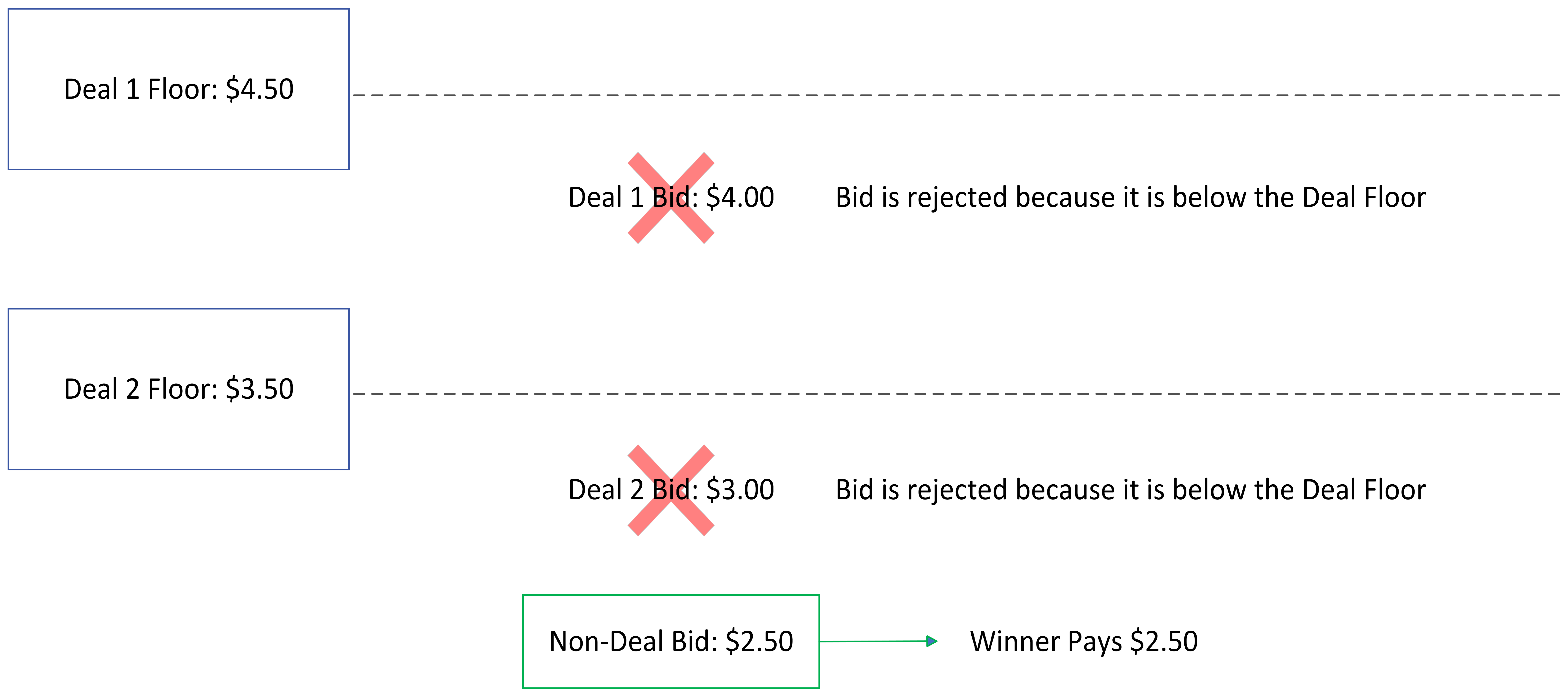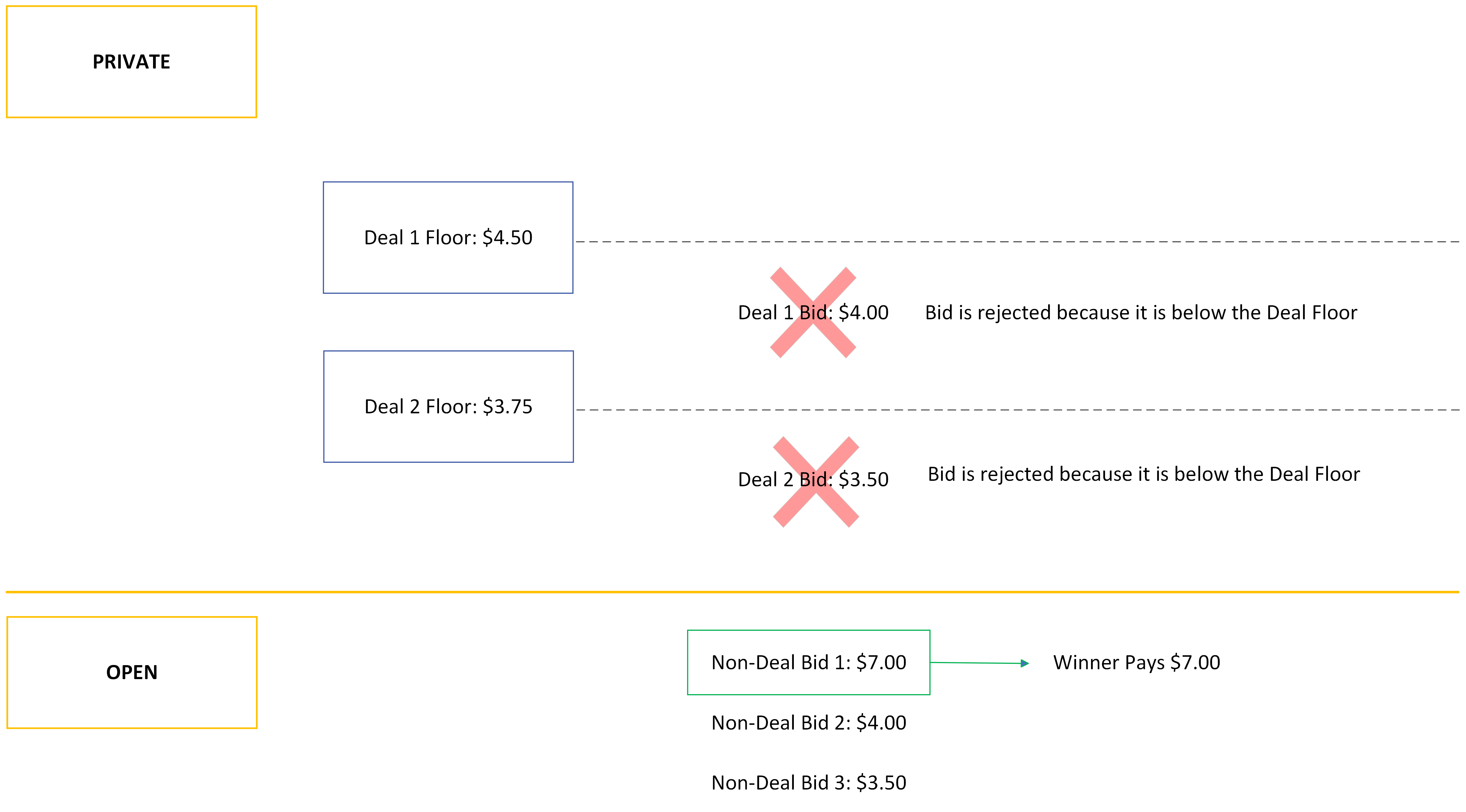Note
Access to this page requires authorization. You can try signing in or changing directories.
Access to this page requires authorization. You can try changing directories.
Note
This documentation is based on first-price auction. If you're still using second-price auction, then see Deal Auction Mechanics for Second-Price Auction.
A deal auction can be open or private, depending on how the seller defined the deal. This page explains how these different types of auctions work and provides examples.
Note
The explanations on this page apply only to deals with Microsoft Monetize sellers, not to deals with external supply partners. For information about an external supply partner's deal types or auction mechanics, contact the external supply partner directly.
Open auctions
When a piece of inventory included in an "open auction" deal comes up for auction, buyers targeting the deal, and buyers targeting the inventory via other means, compete for the impression.
- If a buyer targeting the deal submits the highest bid and the bid clears the deal's ask price, that buyer wins the auction, paying the bid price.
- If one of the non-deal buyers submits the highest bid, that buyer wins the auction, paying the bid price.
Note
Deal Ask Prices vs. Reserve Prices
- If the seller has set a reserve price on their RTB inventory, the deal ask price will take priority over the reserve price.
- A default creative reserve price will always take priority over the placement reserve price.
- A dynamic floor will always take priority over the placement and default creative reserve price.
Examples (open auction)
Deal bid wins

Non-deal bid wins (example 1)

Non-deal bid wins (example 2)

Important
Why does this example have two floors? And why did the non-deal bid win?
In the example above, each of the deal bids has a different floor applied to it. This is because each bid is targeting a different deal and the two deals have different ask prices.
The non-deal bid wins because neither of the deal bids met their deal floor.
Private auctions
When a piece of inventory included in a "private auction" deal comes up for auction, buyers targeting the private deal compete for the impression first. Additionally, private deals can be given a numeric deal priority. Deals with a higher priority will always win over lower priority deals.
If none of the private deal buyers win, the auction is opened to buyers targeting the inventory via other means.
- If a buyer targeting the deal submits a bid higher than the deal's ask price and higher than any other private auction bids, that buyer wins the auction, paying the bid price.
- If no private auction bids clear their ask prices, the highest bid in the open auction wins, paying the bid price.
Examples (private auction)
Deal bid wins in private auction (no open auction held)

Higher priority deal bid wins in private auction (no open auction held)

Non-deal bid wins in open auction (no private auction winner)

Deal prices and yield management rules
Both a deal and a YM rule can apply to the same piece of inventory. This section explains which rules are considered when that piece of inventory comes up for auction.
Deal pricing and floors
If you have set a price for your deal, it will override other pricing mechanisms including floor rules. In other words, deal prices take priority over floor prices.
If you have a deal with no ask price, that is considered a deal with no floor. Your existing floor rules apply to the deal inventory.
If you have a deal with an ask price of 0, that is considered a deal with a floor of 0. The deal floor of 0 takes priority over any YM floors you have.
A YM floor will always take priority over the placement and default creative reserve price.
If the YM floor has Reserve Price Override disabled, then the YM floor will take priority over a dynamic floor.
If the YM floor has Reserve Price Override enabled and the dynamic floor is less than the YM floor, then the YM floor will take priority over a dynamic floor.
If the YM floor has Reserve Price Override enabled and the dynamic floor is greater than the YM floor, then the dynamic floor will take priority over a YM floor.
Deal bid meets deal floor and wins

Fixed price deals
If you select a Fixed Price auction, you will need to enter an ask price. Any buyer who bids above this value (plus relevant fees) will be eligible to bid on the deal. The winning buyer is responsible for the fixed price plus fees. A bid is only eligible if it is above the applicable price for the deal. Any bids below the ask price will be considered ineligible for the deal and the auction. IDs on fixed price deals are ranked according to the deal's ask price (minus relevant fees).

Deal pricing and biases
Yield management biases will still be applied to deal bids, even if you have set a price for your deal.